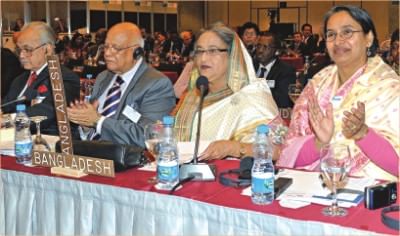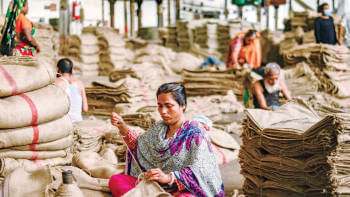LDCs must come out of poverty

Prime Minister Sheikh Hasina addressing the Summit of the LDC Group at the Lutfi Kirdar Convention and Exhibition Centre in Istanbul, Turkey yesterday.Photo: PID
Prime Minister Sheikh Hasina has called upon the development partners to intensify their efforts at lifting the Least Developed Countries (LDCs) out of poverty.
She also urged the LDCs to “redouble” their own efforts to accelerate growth and sustain development in the changed global conditions.
“LDCs need to graduate from their present status. The Istanbul Programme of Action must create the conditions for LDCs to get out of poverty and underdevelopment,”
she said while addressing the Summit of the LDC Group at the Lutfi Kirdar Convention and Exhibition Centre yesterday afternoon.
UN Secretary General Ban Ki-moon, President of the 65th session of the UN General Assembly Joseph Deiss (Switzerland) and Prime Minister of Nepal Jhala Nath Khanal also spoke on the occasion.
Heads of States and Governments of the 48 LDCs attended the summit. Hasina also called on them to “renew, enhance and make available” their full commitments of support timely.
The premier said that by graduating, LDCs would have greater capacity to economically interact, thereby providing added impetus to the developed world in making further progress in their development and living standards.
She said she believed that the Istanbul Summit could create the conditions for transforming the one-sixth of humanity living in LDCs into productive assets and attaining dignified lives.
Hasina urged all to take an oath for creating a strong partnership in promoting human dignity, ensuring good and development-oriented governance, and realising the common vision of a world with equal opportunities for all.
The “LDCs meet today still harbouring insecurities” with fragile economies characterised by structural weaknesses, human asset deficits, marginalisation in trade, wealth generation, technology, connectivity and global decision making, and vulnerabilities to external shocks, she mentioned.
She also mentioned that though the LDCs have made significant progress on MDGs, no comparable progress has been made in enhancing productive capacity and spurring growth keeping pace with developing countries.
“LDCs need to redouble efforts to sustain high levels of growth for long periods to accelerate development. This is possible with enhanced support from our development partners.”
The PM said LDCs acknowledge that development is their own responsibility. Although they've done quite well with domestic resource mobilisation, institutional improvements and development planning in the last decade, sufficient productive capacity has not been added, and nor has the expected human resource development taken place.
“And that is largely because of shortfalls in the commitments of the development partners,” Hasina asserted.
LDCs continue to suffer from global inequity, falling commodity prices, increasing price of high end manufactures and services, unaffordable energy and technology, poor return of foreign investments, and climate change, she noted.
The PM said that in an ever-increasingly globalised world, mankind's “common goal of world peace, security and progress” is attainable only through global cooperation.
The development partners have a clear responsibility towards the LDCs' development. Much could have been achieved if most of them had kept their commitments made most recently in the Brussels' Programme of Action for LDCs, she argued.
“It is unfortunate that some of the partners have not been able to measure up to our expectations. Some are not forthcoming. They point out their difficulty for additional commitments to the recent global financial meltdown. This meltdown has also affected LDCs' efforts to reduce poverty, enhance economic growth and attain the MDGs,” she said.
She also blamed them for protectionist policies.
Moreover, global warming and climate change, which originated due to the industrialisation in the developed world, have adversely affected the LDCs in terms of reduction in official development assistance, investment, export earnings, remittances, tourism, and spiralling energy and food prices, she said.
Food security is central to the needs of the LDCs, she said. Food productivity, affordability, and accessibility are of great concern, calling for greater investment in agriculture and facilitation of technology transfer from developed countries to the LDCs.
The adverse effects of climate change are experienced worldwide, and never more so than among the LDCs, she mentioned.
“For Bangladesh, climate change is expected to affect the livelihoods of one-fourth of our population, displace over 20 million people, and destroy existing bio-diversity and ecology. Most of the LDCs face similar situation and therefore, must be compensated for climate change-induced ills.”
She claimed that assistance to tackle these effects ought to be over and above the ODA provided for in the Brussels Programme of Action.
LDCs must get adaptation support and green technology at affordable prices. As for the climate migrants, a new legal regime under UNFCC Protocol ensuring their social, cultural and economic rehabilitation, needs to be in place.
She also presented a host of issues for inclusion in the 'Istanbul Outcome Documents'.
Broadly, these include trade with enhanced and meaningful access to markets of developed countries for LDC products, developed countries honouring their commitments made in Brussels and enhancing their commitments in Istanbul in the face of new realities such as climate change. These also include the continuation of debt relief under bilateral and multilateral frameworks for the highly indebted poor countries, and compensating LDCs for prudent management of their debt situations. There would also be availability of energy, including new and renewable forms, to the LDCs in a manner that is stable, cost effective, diverse, clean and affordable.
The other issues proposed by the PM were an undertaking of some sort for transfer of appropriate technology at affordable cost to the LDCs, commitment on removal of present impediments to free movement of labour, periodic monitoring of performance on the part of LDCs as well as their development partners for the realisation of commitments made under the Istanbul Programme of Action, and the crafting of something more than a simple review conference as has been the case in recent years.
Bangladesh Finance Minister AMA Muhith, Planning Minister Air Vice-Marshal (Rtd) A K Khandakar and Foreign Minister Dipu Moni, among others, were present.

 For all latest news, follow The Daily Star's Google News channel.
For all latest news, follow The Daily Star's Google News channel. 



Comments